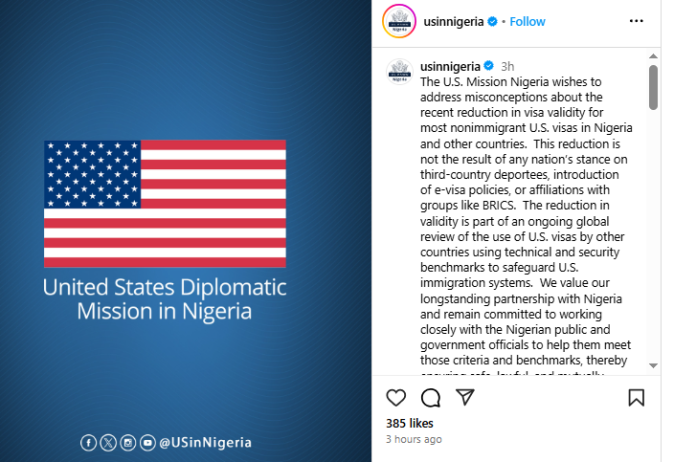
The US Embassy in Nigeria has stated that the recent decrease in the duration of non-immigrant visas is not a result of any nation’s stance on third-country deportees, the introduction of e-visa policies, or affiliations with groups like BRICS.
It was announced on July 8 by the US Embassy in Nigeria that non-immigrant visas would now only be valid for single entry and three months. Although the change is effective immediately, visas issued prior to July 8 will continue to be valid under their original conditions. Read here.
Since the announcement of Nigeria’s short visa validity, some people have conjectured that the US government made this decision because of President Tinubu’s attendance at the BRICS meeting and Nigerians’ membership in the group. A portion of the Nigerian media earlier today asserted that Nigeria’s refusal to accept asylum seekers was the reason for the decrease in visa validity. They claimed the US president, Donald Trump, has been pressuring numerous nations to act as temporary shelters for asylum seekers while their cases are being handled, which can take up to seven years. According to the reports, Nigeria has declined to participate in the agreement, even though other nations have agreed.
The embassy, however, claimed in a social media statement that this and other arguments being floated are untrue and have nothing to do with the visa’s expiration date being shortened.
The statement reads
‘’The U.S. Mission Nigeria wishes to address misconceptions about the recent reduction in visa validity for most nonimmigrant U.S. visas in Nigeria and other countries. This reduction is not the result of any nation’s stance on third-country deportees, introduction of e-visa policies, or affiliations with groups like BRICS. The reduction in validity is part of an ongoing global review of the use of U.S. visas by other countries using technical and security benchmarks to safeguard U.S. immigration systems. We value our longstanding partnership with Nigeria and remain committed to working closely with the Nigerian public and government officials to help them meet those criteria and benchmarks, thereby ensuring safe, lawful, and mutually beneficial travel between our nations.”




